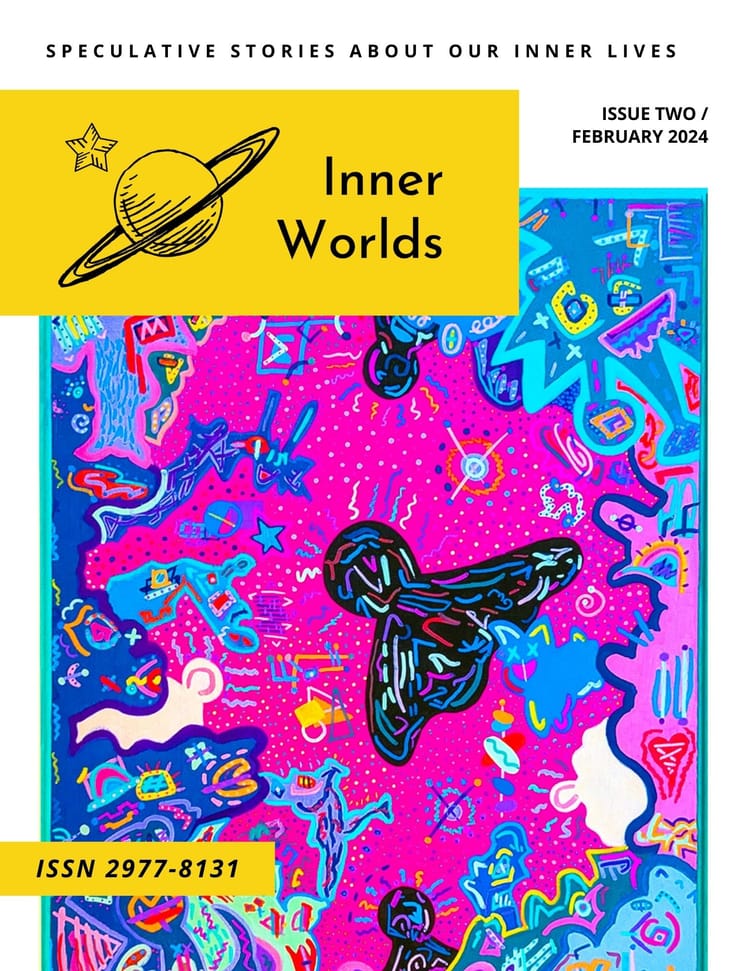Death of a Thousand Papercuts, by Avra Margariti

Content warnings
Violence. Self harm. Infected wound.
It starts with a papercut. You raise your pointer finger in the negative space between us, and in the face of the thinnest sliver of blood, your mouth forms a ring of despair, disbelief.
It’s okay, I say and rush your hand under the faucet, grateful it’s not our apartment’s turn to have the water supply cut off this week. I hide the way my hands tremble as I cradle yours under the brown-tinged water. I try not to think about infections. And the implications of what happens afterward.
You’re right, you say and smile, fake as our potted plastic plants and the dead stars twinkling outside the window. It will all be okay.
It’s not okay, it never is any more.
You try to hide the way your finger throbs and swells, the fever, the wallpaper-yellow pus. You writhe with night terrors in our bed, only to daub concealer all over your shiny face in the morning, say you need to go to work or else, or else.
Let’s visit the pharmacy, I plead. Maybe they can help.
Except they never do—they can’t, not until it’s nearly too late.
In the flickering lights, among half-empty shelves and locked medicine cabinets—password protected, lock-pick-proof—the pharmacist watches us with sharply raised eyebrows behind sleek cat-eye glasses.
The beads of sweat across your forehead appear bigger than my pinky nail against the sterile white backdrop of the pharmacy. You sway and I catch you around the waist, let you lean against me. I puff out my chest and try to stand tall even though all I want is to curl up and disappear under that cold, disapproving stare of the meticulously trained clerk.
Like we’re criminals. Like we’re liars.
Your skin against mine feels fevered, furnace hot.
Please, I tell the pharmacist through the foggy glass screen separating us. My partner is sick. Their wound got infected. Can you give us some antibiotics? Perhaps something for the pain, too. Can you help?
I try not to think about the sore throat I’ve had all week working at the pharmaceutical factory, each of my coughs lung-deep and chemical-sour. I would steal some meds on my next night shift, if I didn’t know the consequences.
With the cost of production and patents going up-up-up, the regulations become tight, tighter, a noose tightening around our necks.
The pharmacist blinks, each flutter of eyelashes a calculated motion. Addicted to painkillers, are you? She scoffs at us, and you try to hide behind my back, nearly losing your footing in the process. The pharmacist is staring at her computer screen, unconcerned. Your files say your spouse has a history of hypochondria and a long streak of anti-depressant overuse.
I bite my mouth bloody and don’t say that any use of pills at all is considered an overuse these days.
Your eyes shed tears as your finger sheds pus. Our whole lives, reduced to a few lines of impersonal script reflected off the pharmacist’s oversized glasses.
Can’t you see it? I plead. Look at my partner’s finger!
And it’s my turn to be a butterfly pinned under her lepidopterist’s stare. The clerk is now looking at my file, I know it in my shivering bones. Chronic pain, chronic cough.
A serial maladaptive daydreamer.
I take you by the hand—the non-swollen, uninjured one—and drag you away before she can accuse us of more deceptions. Of it all being a trick to get drugs, a trick of our minds. It’s all in your heads, the million-told words echo as your bandaged finger weeps a watery trail all the way home.
It all feels like a thousand papercuts.
I twist and turn in our bed. Your whole hand looks wrong in the low lamplight, like an overstuffed pillow, red-hot and bulging. Your office job turned you away, an unpaid leave until you dealt with the issue, or else.
Or else.
I think about my coworkers at the factory. How their cough wouldn’t be treated even when it turned into pneumonia, liquid-filled lungs and choking breaths. They couldn’t get any meds until they were forced to make a deal with each other, intentionally inhaling even more hazardous material, their bodies convulsing on the dusty factory floor. Then and only then, begrudgingly, did the officials approve of the medication needed to clear their lungs.
I must fall asleep eventually, next to your overheating body. In my dream I pick up a knife and pare your skin down to the bone as you cry, to spare you I say, to save you, I’m doing this for you, only for you.
Don’t you know? The pain, the blight, the cuts don’t stem from the body. It’s their words. That is the thing that hurts the most.
I resurface to the sound of a muffled scream, and at first I can’t tell if I’m dreaming or awake. The fevered heat and meat smell lingers.
I rush to the kitchen to find you struggling to open the faucet and clean the blood spilled everywhere, but it’s not our turn with the running water this week. Not a drop remains to wash away the rust-smelling redness.
What did you do? I ask, staring at your jagged bone peeking out between the puckered pink flesh. Your finger sits disembodied in the sink, next to a pair of stained kitchen scissors.
You smile through your tears. Don’t worry. It’s just a papercut.
Avra Margariti
Avra Margariti is a queer author and Pushcart-nominated poet with a fondness for the dark and the darling. Avra’s work haunts publications such as Vastarien, Asimov's, Liminality, Arsenika, The Future Fire, Space and Time, Lackington's, and Reckoning. Avra lives and studies in Athens, Greece. You can find Avra on Twitter as @avramargariti





Member discussion